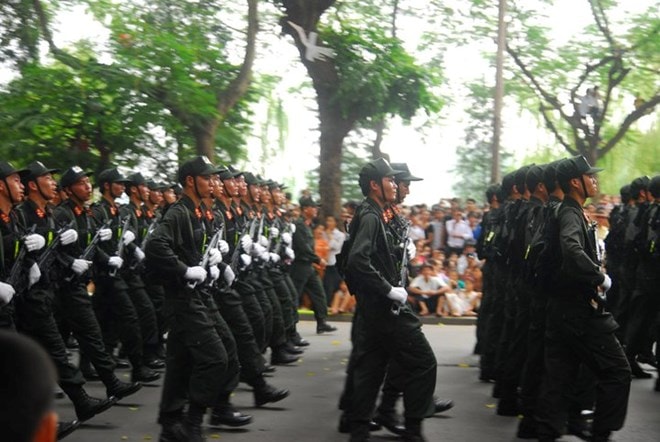The Office of the President promulgates two decrees
On the morning of March 17, the Office of the President held a press conference to announce the President's Order promulgating the Mobile Police Ordinance and the Ordinance on procedures for considering and deciding on the application of administrative measures at the People's Court.
 |
| Mobile Police - Core force in armed work to protect security and social safety |
The Mobile Police Ordinance was passed by the Standing Committee of the 13th National Assembly on December 23, 2013, consisting of five chapters and 24 articles, effective from July 1, 2014.
The Ordinance stipulates the position, functions; principles of operation and force building of the mobile police; tasks, powers and organization of the mobile police; responsibilities of the Commander of the Mobile Police and the Director of Public Security of provinces and centrally-run cities; regulations on the mobilization of mobile police and the use of weapons, explosives, support tools, and technical means of the mobile police...
On the basis of determining the position and function of the mobile police under the People's Public Security, it is the core force implementing armed measures to protect security, maintain social order and safety and perform other tasks as prescribed by law.
According to the Ordinance, the mobile police are responsible for advising the Central Party Committee of Public Security and the Ministry of Public Security on armed work to protect security, maintain order and social safety; implement combat plans to combat security sabotage activities, armed riots, terrorism, hostage taking; suppress crimes using weapons...
In terms of organization, the mobile police force consists of four forces: special task force; special operations force; target protection force; force for training and using service animals, organized according to the model of the Mobile Police Command and Mobile Police of the Public Security of provinces and centrally-run cities.
In addition to the general policies for the people's police, the mobile police also enjoy special preferential policies according to the nature, tasks, and areas of operation. Mobile police working stably and long-term in independent military areas are arranged official housing.
Ensuring publicity and transparency in reviewing and deciding on administrative measures
With five chapters and 42 articles, the Ordinance on procedures for considering and deciding on the application of administrative measures at People's Courts was passed by the Standing Committee of the 13th National Assembly on January 20, 2014 and took effect from the date of signing and promulgation.
In cases where competent authorities have prepared records to consider postponing or exempting the execution of decisions on applying administrative measures, reducing the term, temporarily suspending or exempting the execution of the remaining time of applying administrative measures, if the Ordinance takes effect but has not been resolved, the provisions of this Ordinance shall apply.
The Ordinance has institutionalized the Party's viewpoints, guidelines and policies on reforming the legal system, judicial reform and administrative reform as defined in the Party's resolutions and documents; ensuring strict, quick and feasible procedures for considering and deciding on the application of administrative measures; at the same time enhancing publicity, transparency, fairness and democracy in the process of considering and deciding on the application of administrative measures; ensuring the basic rights of citizens, human rights, especially the rights of minors in the process of considering and deciding on the application of administrative measures.
The Ordinance stipulates that the Court with jurisdiction to consider and decide on the application of administrative measures is the District Court where the requesting agency is headquartered; the Provincial Court has jurisdiction to review the decision of the District Court that is subject to complaints, petitions, or protests. The time limit for considering and deciding on the application of administrative measures is 15 days from the date the court receives the request from the competent agency; for complicated cases, this time limit may be extended but not more than 30 days...
According to Vietnam+






